

Disordered eating theories. Executive functioning theories. Cognitive deficits in obese persons with and without binge eating disorder. Investigation using a mental flexibility task. Research report a Cognitive Psychopathology and Neuropsychology Unit, Psychology Department, University of Geneva, Boulevard du Pont d’Arve, 40, CH-1205 Geneva, Switzerlandb Methodology and Data Analysis Unit, Psychology Department, University of Geneva, Switzerlandc Service of Therapeutic Patient Education for Chronic Diseases, University Hospital Geneva, Geneva, Switzerlandd Cognitive Psychopathology Unit, University of Liege, Belgium Received 3 February 2010, Revised 1 April 2011, Accepted 29 April 2011, Available online 8 May 2011 Choose an option to locate/access this article: Check if you have access through your login credentials or your institution Check access doi:10.1016/j.appet.2011.04.023 Get rights and content Abstract Objective: Studies suggest that cognitive deficits and attentional biases play a role in the development and maintenance of obesity and eating disorders.
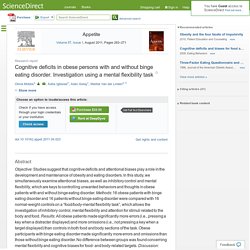
Highlights Keywords Copyright © 2011 Elsevier Ltd. Mindfulness Moderates the Relationship Between Disordered Eating Cognitions and Disordered Eating Behaviors in a Non-Clinical College Sample. Academy for eating disorders position paper: Eating disorders are serious mental illnesses - Klump - 2008 - International Journal of Eating Disorders. Neuropsychological study of underweight and “weight-recovered” anorexia nervosa compared with bulimia nervosa and normal controls - Bosanac - 2007 - International Journal of Eating Disorders. PsycNET - Display Record. An Error Occurred Setting Your User Cookie. This site uses cookies to improve performance.

If your browser does not accept cookies, you cannot view this site. Setting Your Browser to Accept Cookies There are many reasons why a cookie could not be set correctly. Below are the most common reasons: You have cookies disabled in your browser. Why Does this Site Require Cookies? This site uses cookies to improve performance by remembering that you are logged in when you go from page to page. What Gets Stored in a Cookie? This site stores nothing other than an automatically generated session ID in the cookie; no other information is captured. In general, only the information that you provide, or the choices you make while visiting a web site, can be stored in a cookie. GetSharedSiteSession?rc=1&redirect=
Binge eating is associated with right orbitofrontal-insular-striatal atrophy in frontotemporal dementia. Articles J.
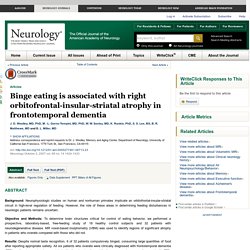
D. Systematic Review: Are Overweight and Obese Individuals Impaired on Behavioural Tasks of Executive Functioning? The Role of Cognitive Deficits in the Development of Eating Disorders. Executive functioning and behavioral impulsivity of young women who binge eat - Kelly - 2013 - International Journal of Eating Disorders. Genetic epidemiology, endophenotypes, and eating disorder classification - Bulik - 2007 - International Journal of Eating Disorders.
Life History Strategy and Disordered Eating Behavior. Catherine Salmon⇑
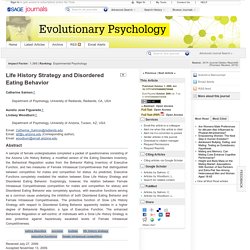
Executive Functions Profile in Extreme Eating/Weight Conditions: From Anorexia Nervosa to Obesity. Abstract Background Extreme weight conditions (EWC) groups along a continuum may share some biological risk factors and intermediate neurocognitive phenotypes.
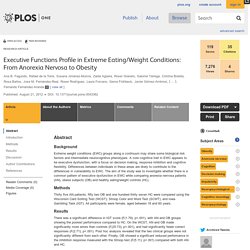
A core cognitive trait in EWC appears to be executive dysfunction, with a focus on decision making, response inhibition and cognitive flexibility. Differences between individuals in these areas are likely to contribute to the differences in vulnerability to EWC. The aim of the study was to investigate whether there is a common pattern of executive dysfunction in EWC while comparing anorexia nervosa patients (AN), obese subjects (OB) and healthy eating/weight controls (HC). Methods Thirty five AN patients, fifty two OB and one hundred thirty seven HC were compared using the Wisconsin Card Sorting Test (WCST); Stroop Color and Word Test (SCWT); and Iowa Gambling Task (IGT). Results There was a significant difference in IGT score (F(1.79); p<.001), with AN and OB groups showing the poorest performance compared to HC.
Conclusions Methods. PsycNET - Display Record. An Error Occurred Setting Your User Cookie. Handbook of Self and Identity. Mark R.
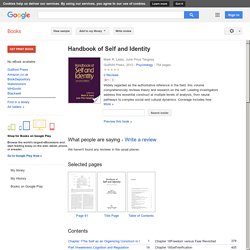
Leary, PhD, is Professor of Psychology and Neuroscience at Duke University. His research focuses on the processes by which people think about and evaluate themselves; the effects of self-reflection on emotion and psychological well-being; and how people are influenced by concerns about how they are perceived and evaluated by others. He is a Fellow of the American Psychological Association, the Association for Psychological Science, and the Society for Personality and Social Psychology, and a recipient of the Lifetime Career Award from the International Society for Self and Identity.
Dr. Sciencedirect. School of Psychology, Flinders University, GPO Box 2100, Adelaide, SA 5001, Australia Received 15 April 2005, Revised 24 October 2005, Accepted 28 October 2005, Available online 7 December 2005 Choose an option to locate/access this article: Check if you have access through your login credentials or your institution.
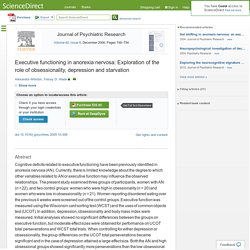
PsycNET - Display Record. Disordered Eating and ADD. ADHD and Disordered Eating John Fleming, Ph.D. and Lance Levy, M.B.

Published in Gender Issues and ADHD: Research, Diagnosis, and Treatment Edited by Patricia Quinn, M.D. and Kathleen Nadeau, Ph.D.2002, Advantage Books. Available at Addvance website www.addvance.com Reprinted by permission. ASSOCIATIONS BETWEEN BINGE EATING AND EXECUTIVE FUNCTIONING AMONG. Executive Function Index (EFI) performance and risk factors for disordered eating. University of North Dakota, United States Received 5 February 2014, Accepted 21 August 2014, Available online 28 August 2014 Choose an option to locate/access this article: Check if you have access through your login credentials or your institution Check access doi:10.1016/j.eatbeh.2014.08.006.
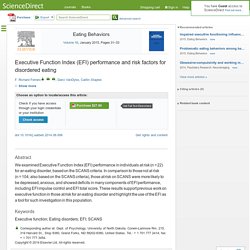
Inside the Eating-Disordered Mind.